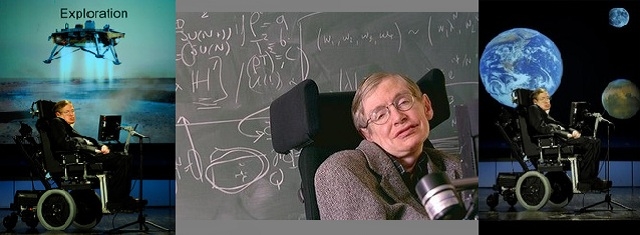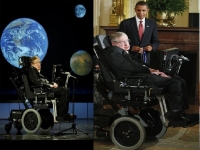Technology
ASTROPHYSICIST STEPHEN HAWKING SAID FALLING INTO A BLACK HOLE IS NOT THE END
INSPIRED FILM THE THEORY OF EVERYTHING

(Source: Stephen Hawking)
The British Astrophysicist Stephen Hawking, who inspired the famous British 2014 Film "The Theory of Everything", declared that disappearing into a black hole may not represent permanent disappearance. He was speaking at a conference in Stockolm's KTH Royal Institute of Technology. Stephen Hawking also said that, if you find yourself stuck inside a black hole, you may die but all traces of your existence may not be lost forever.
He said "There is a way out". Quantum mechanics says information cannot be permanently destroyed. Stephen Hawking proposes that the information is stored not in the interior of the black hole but on its boundary, the event horizon. Hawking even suggested that the information could come out in another universe.
Hawking's new work is an attemp to solve what is known as the black-hole firewall paradox, which has been vexing physicists for almost two years, after it was discovered by theoretical physicist Joseph Polchinski of the Kalvi Institute and his colleagues.
Hawking's new work is an attemp to solve what is known as the black-hole firewall paradox, which has been vexing physicists for almost two years, after it was discovered by theoretical physicist Joseph Polchinski of the Kalvi Institute and his colleagues.
Quantum mechanics and general relativity remain intact, but black holes simply do not have an event horizon to catch fire. The key to his claim is that quantum effects around the black hole cause space-time to fluctuate too wildely for a sharp boundary surface to exist. (Nature)
None of this is to suggest a human being could survive being consumed by a black hole. But if you were to get devoured by the universe's apex predator, the essence of you would, in howere limited a sense, stay around. Hawkings said, during the conference, "If you feel you are in a black hole, don't give up...There is a way out."
None of this is to suggest a human being could survive being consumed by a black hole. But if you were to get devoured by the universe's apex predator, the essence of you would, in howere limited a sense, stay around. Hawkings said, during the conference, "If you feel you are in a black hole, don't give up...There is a way out."
Ruby Bird Black Hole Stephen Hawking Astrophysicist The Theory Of Everything British Film 2014 Disappearance Quantum Mechanics Information Universe Paradox Joseph Polchinski Kalvi Institute Relativity Event Horizon Firewall
Liability for this article lies with the author, who also holds the copyright. Editorial content from USPA may be quoted on other websites as long as the quote comprises no more than 5% of the entire text, is marked as such and the source is named (via hyperlink).









